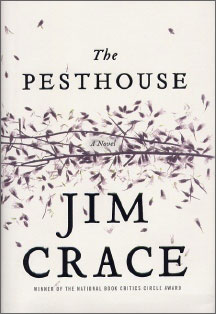 |
 Jim Crace
Jim Crace
The Pesthouse
Reviewed by: Rick Kleffel © 2007
Nan A. Talese / Doubleday / Random House
US First Edition Hardcover
ISBN 978-0-385-52075-1
256 Pages; $24.95
Publication Date: 05-01-2007
Date Reviewed: 06-18-2007
Index:
General Fiction
Science Fiction
Fantasy
We can only read about death if we're not dead. And we can only read about the end of civilization in the midst of civilization. Outside our safe houses, the cars slide down the streets and trucks deliver food to burgeoning grocery stores, while fire trucks and police cars wait patent and ready, lest disaster strike. Inside the houses, we are safe to keep watch on our world, to immerse ourselves in imaginative visions in which the comforts and safety we enjoy have been swept away. Only in prosperity can we enjoy tales of adversity.
It's with a peculiar frisson of pleasure that one reads 'The Pesthouse' by Jim Crace. The world we now know has been summarily swept aside. There's no specific indication as to what brought about the upending of the lives we now lead. Some unspecified number of years in the future, America has been reduced, if that's the right word, to a pre-18th century wilderness devoid for the most part of working technology. Even the ruins are pretty much gone. Those who wish to prosper, to find a life beyond the hardscrabble of day-to-day existence, have no choice but to go east. There is hope in the ships that slowly cross the Atlantic Ocean, taking passengers to an almost legendary life in England or Europe. Civilization itself has become a myth.
Franklin Lopez and his brother Jackson are on such a journey, the anti-myth-of-the-west, when Franklin blows out his knee. Forced to remain behind on a mountainous pass, he finds shelter in the Pesthouse with Margaret, a woman who may or may not be infected with the Flux. Jackson journeys down the pass to Ferrytown, where nature has plans of its own, beyond the control or comprehension of those who inhabit this world. Margaret and Franklin, brought together by weakness, must find the strength to continue eastward, to civilization. For any one of us, it would be a day or so of driving, riding the trains, a short plane hop. For Margaret and Franklin, it's a mythic journey.
'The Pesthouse' is a novel drenched in melancholy and joy. Crace operates on a variety of levels with equal ease, whether he's taking us through the harsh beauty of nature re-asserting itself on a land once wrought by the hand of man or on an inner journey through multiple inversions of the myths we cherish, or the beliefs that create the world in which we're reading the novel. Taken as a simple journey, 'The Pesthouse' is powered by the poetry of Crace's language. It's a remarkably immersive feat, the language in this novel. It’s not amenable to dissection or analysis. Crace simply places us in a landscape with a minimum of fuss. Yet there's an undeniable beauty to the sentences here, an effortless evocation of the American landscape stripped of strip malls, a world of nature once again run rampant like the paradise that must have greeted the first American settlers who saw hope in the American west.
Crace has peopled his landscape with a variety of characters. Franklin is a big young man. But he's not all that complicated. His life until he shows up at the Pesthouse has mostly consisted of farm work at the home he left behind to, go east, young man. In contrast, Margaret, raised in the comparatively riotous atmosphere of Ferrytown, is a woman who embodies the small conflicts of a wounded world. Crace's language is both their saving grace. In lesser hands, both could be annoyingly dull and superfluously meaningful. But Crace applies the same sober poetry to his people as he does to the landscape they move through. He knows how to plant sympathetic hooks in the reader, to let us like his people rather than trying to make us like them. You might not notice even after you've read the book.
Franklin and Margaret are not alone. Crace uses his skills as a writer to apply just the right number of grace notes to a larger cast of secondary characters to bring them to prickly, sometimes humorous life. From a middle-class middle American couple — the Boses — to the inhabitants of the "Finger Baptist" religious community, Crace offers the kind of variety in his novel that is required to keep the largely pastoral setting of interest to the modern reader. Particularly noteworthy are the women of a coastal town, who have a fierce life that claws its way forth from the pages to scratch through the complacency one tends to find in post-apocalyptic fiction.
Though he's written a novel set in some future of uncertain provenance, Crace, like many of today's best science fiction writers, is aware that he's not making a prediction of the future so much as re-arranging the present. The mythic and anti-mythic undercurrents of 'The Pesthouse' have a real visionary power. Sometimes they manifest in a very funny sense of humor, and others in a wistful upending of the world we live in. It's a mixed bag, this future, set in despair, detoured through the absurd, still open to the possibility of dreams. This is hope discovered in the ruins. It's not a gift the world he has created gives Crace's characters. It requires effort on the part of those in this world. This is how the world ends not with a bang, but a reset.
|
 |
